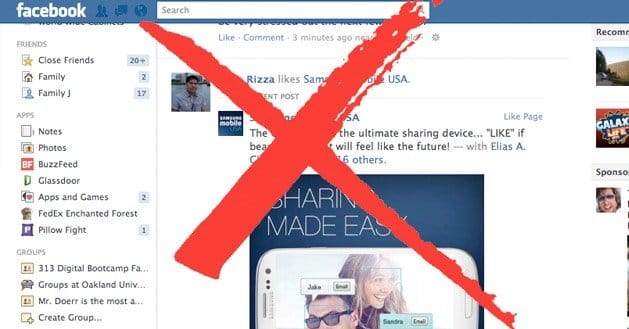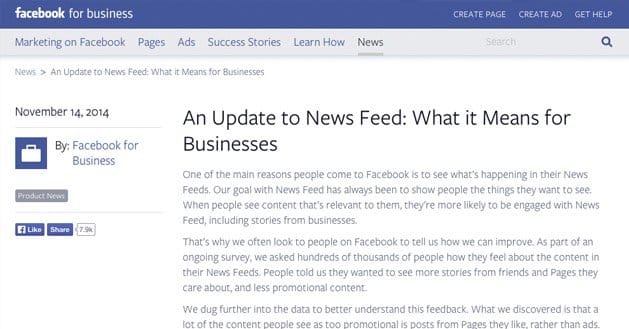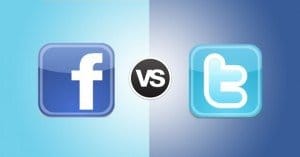 Written by ContentPowered.com
Written by ContentPowered.com
For some time now, Facebook has been pushing brands to be less companies using the platform as advertising, and more entities socializing with people on the platform. Everything they’ve done to change pages, from moving tabs to reducing organic reach, is a push in that direction. They’re not opposed to using their site for advertising – far from it, in fact. They just want you to use the appropriate channels, i.e. Facebook Ads.
The most cynical of us tend to believe this is a ploy by Facebook to increase their revenue, through pushing people to pay for ads to get what they once got organically. I’m not quite that cynical, but I do believe that Facebook knows full well that the moves they make will affect their profits. They aren’t motivated solely by those profits, however.
User Experience
See, Facebook has to have the user experience in mind. If they let their platform decay into a spiral of advertising, with companies clamoring to out-shout each other for your attention, you would leave. It’s that simple; when the user experience disintegrates, so too does a website’s user-base. It would take some time for everyone to abandon the site, but all it would take is one good ad-free replacement and Facebook would die a gruesome, ignoble death.
Facebook needs to consider the user experience, then, and not just their bottom line. To that end, they constantly solicit and listen to feedback from users. Feedback comes through their support forums and comments channels, conversations on their business blogs, and analysis of what users are reporting as spam and hiding in terms of posts in their feed.
It’s well known that Facebook curates the news feed for people. It’s obvious why, too; the average user would see somewhere around 1,500 posts per day if it was completely unfiltered. With EdgeRank in play and the curation engine in full force, that number is cut to closer to 300. A drastic difference.
In order to display the most important stories, Facebook filters out what you don’t want to see. It does this primarily by analyzing what you interact with from day to day. When you comment on a post made by a friend, you’re more likely to see more posts by that friend in the coming days. Heck, you even see more from a friend when you visit their profile, even if you don’t do anything there.
The same goes for brands; when you interact with a brand, you then see more posts from that brand more often. If time passes and you don’t interact with that brand, you see less and less of their content. Eventually, Facebook stops showing you posts from that brand entirely. There are a few wildcards to keep it from being degenerate, but that’s the way it works, more or less.
Recently, Facebook made an announcement that made a lot of businesses mad. That announcement was that they listened to user feedback and have determined that users really don’t want to see advertisements in their news feed.
This seems like a “no duh” moment to some of us, but to others it’s devastating news. Before you go crying apocalypse, however, take a look into the deeper context of the statement.
Facebook Reducing Ads in Newsfeeds
The first thing you need to know is that it’s always been obvious and it’s always been the case that users don’t like reading commercials in their news feed. It’s true on Facebook, it’s true on Twitter, it’s true on Pinterest, it’s true on Ello, it’s true everywhere. Heck, it’s the same reason a lot of web forums ban advertising except through banner ads. Users don’t want to see it.
The second thing to know is that it’s not a blanket ban on all promotional content. For one thing, promoted posts and news feed ads are still perfectly okay. You’re no more limited in their content than you have been since they were first created. You can be as promotional as you want, as long as you’re paying for it.
There’s that cynicism again.
The third thing to know is that Facebook’s definition of promotional content is probably a lot more narrow than most businesses are afraid of. As Jon Loomer, perhaps the Internet’s foremost authority on Facebook advertising, says in that previous link, promotional content is only:
- Content that has no purpose beyond getting people to buy a product or install an app.
- Content that pushes people to enter contests or sweepstakes without any other valuable context.
- Content that has copy more or less identical to ads.
So, you know, don’t copy and paste your ad text into your organic posts and expect it to fly, right? It’s really that simple. Facebook isn’t telling brands they can’t act like brands, that would be suicide from another perspective. After all, advertising dollars are a good chunk of what keeps Facebook afloat.
The thing you need to take away from all of this is that you need to be valuable to your users. And no, “they can buy my cool product!” isn’t valuable. That’s valuable to you, but not necessarily to your users.
When I say valuable, what I mean is something the user gets out of your posts that they don’t have to pay for. It might be an informational blog post. It might be telling them about a new TV show they might want to watch. It might be sharing a piece of industry news. It might be a product announcement, to build awareness and not preorders. It might be customer service in public form.
Whatever the case, you do need to avoid being purely promotional. It’s no longer just a recommendation to get more engagement out of your posts; it’s a necessity. Facebook is actively penalizing the posts it deems promotional, and it’s hurting the brands that make those posts.
View your customers as people, not as walking ATMs. Win their hearts and minds, and they will gladly open their wallets to you. Just don’t go for their wallets; they’ll view you as the pickpocket you’re trying to be.





